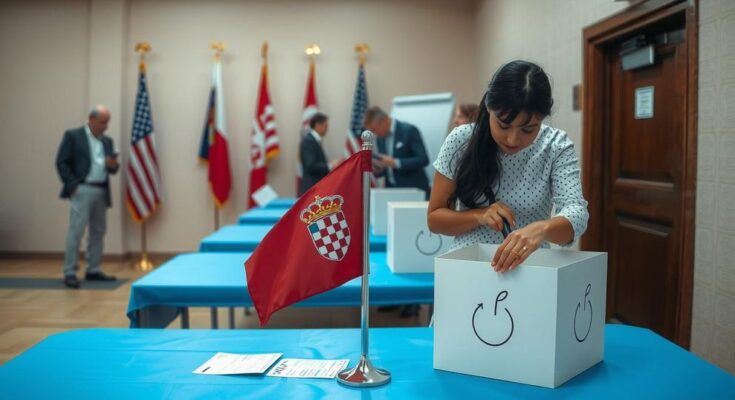Croatia’s presidential election features incumbent Zoran Milanović, known for his skepticism of NATO and EU policies regarding Ukraine, running against Dragan Primorac from the ruling party. While facing seven challengers, Milanović is likely to enter a runoff election. The political landscape highlights ongoing tensions between Western alliances and national interests as citizens grapple with economic and societal issues.
The presidential election in Croatia features the incumbent president, Zoran Milanović, who is known for his leftist leanings and criticisms of NATO and EU support for Ukraine amidst the ongoing conflict with Russia. While forecasted not to secure an outright majority in the first round, Milanović is expected to proceed to a second round against his main rival, Dragan Primorac, from the ruling Croatian Democratic Union. The political atmosphere is charged as Prime Minister Andrej Plenković argues that the election is crucial for Croatia’s alignment within Europe and NATO, labeling Milanović as a pro-Russian figure.
Milanović, who served previously as prime minister, has adopted a populist approach and has been vocally oppositional to the current government’s military associations. His stance includes a refusal of Croatian involvement in NATO-led missions concerning Ukraine, underscoring his belief that Croatia should remain neutral in international conflicts despite its NATO and EU memberships. The election also highlights societal concerns, with Raspudić focusing her campaign on corruption and economic issues affecting citizens.
Croatia is poised to conduct its third major election of the year, following parliamentary and European Union elections. The position of the president, while largely ceremonial, holds substantial political power, especially for military and diplomatic matters. The election presents a critical moment for Croatia’s future, particularly regarding its role in European and NATO affairs. The contrast between the candidates reflects broader political tensions regarding national identity, foreign relations, and governmental integrity in the current Croatian administration.
In conclusion, Croatia’s presidential election not only serves as a referendum on President Zoran Milanović’s policies and stance towards international alliances but also represents a pivotal choice about the country’s national direction. With the potential for a runoff, the outcome will significantly shape Croatia’s identity within the broader European context and its engagement with global issues. As citizens prepare to cast their votes, the debate over the nation’s future remains at the forefront of the political discourse.
Original Source: abcnews.go.com




